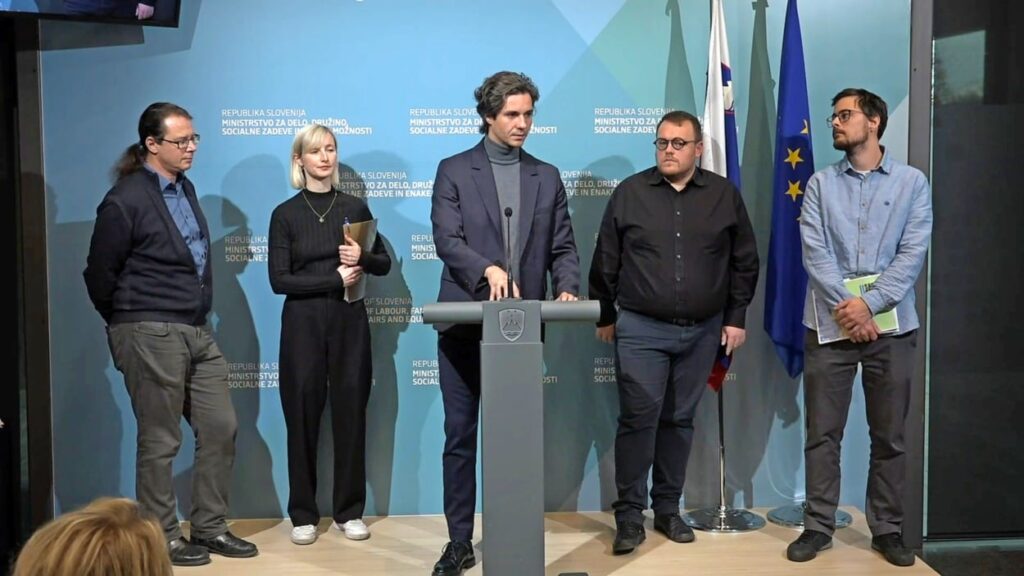While we have been hearing a lot lately about the importance of women in politics, some people care very little about meeting the “women’s quota” in the government. Minister of Foreign Affairs Tanja Fajon has recently been emphasising the transformation of foreign policy into a more “feminist” one, but on the other hand, she does not seem to care about the situation in our own country. The Ministry of Solidarity-Based Future, headed by Simon Maljevac, is made up of an all-male staff. Is this a coincidence, or were the Minister’s sexual preferences the criterion?
The new Ministry of Solidarity-Based Future is headed by former Metelkova LGBT activist Simon Maljevac, together with State Secretaries Luka Omladič and Klemen Ploštajner, and Andrej Vrhunc has been appointed Acting Secretary-General. The Ministry of Solidarity-Based Future, which in itself sounds like a ministry where the soft skills that women are best at should be present, is nevertheless made up of all-male representatives. Given his LGBT activism and knowledge of sexuality (including under the influence of drugs), the question arises whether the Minister’s sexual preferences may have played a major role in the selection of the team.
Slovenian politics is becoming increasingly “feminist”. At least according to the President of the Republic of Slovenia, Nataša Pirc Musar, who recently said that now that women have taken on a lot of political responsibility in the country, they are also doing something concrete for gender equality. Foreign Minister Tanja Fajon has made feminist foreign policy one of the pillars of Slovenia’s renewed foreign policy strategy. Feminist foreign policy means that the country is committed to gender equality in foreign policy. Both politicians have stressed that Slovenia will pay special attention in this context to the empowerment of women and girls in all aspects of politics, but this clearly went past Maljevac, who “empowered” his team exclusively with men. This was noticed by many, including political analyst Darko Mršić, who tweeted: “Ministry of Solidarity-Based Future: Simon Maljevac (Minister), Klemen Ploštajner (State Secretary), Luka Omladič (State Secretary), Primož Siter (PR). No women in leadership positions. The Institute of the 8th of March (Inštitut 8. marec) has not called a press conference, the first tear of Communism, Sonja Lokar, has not organised a protest, the “She Knows” (Ona ve) organisation does not know anything…”.
The State Secretaries at the Ministry in question are philosopher Luka Omladič and sociologist Klemen Ploštajner. Omladič, who is also a member of the Left party (Levica) like Maljevac, is responsible for long-term care, while Ploštajner is responsible for housing policy and economic democracy. Keep in mind that it makes sense to think of several scenarios as to why such a choice was made, and whether it was a matter of personal preference. It should also be pointed out that Maljevac was the President of Legebitra, an NGO for homosexuals, which, together with the Ministry of Health, the Student Organisation of Slovenia and the Municipality of Ljubljana, published a publication for young people in 2017, in which, among other things, he explains and “teaches” the youth about sex toys, about “chemsex” (sex under the influence of drugs), “fisting” and even “ass-licking”. The publication was also intended, among other things, to “teach” about safety practices against HIV infection, which is known to spread most rapidly and frequently among homosexuals.
Since speculation is one thing and facts are another, we turned directly to the Ministry of Solidarity-Based Future for answers: “With the appointment of the Minister of Solidarity-Based Future, Simon Maljevac, and his team, we would like to know the following:
- Why did you not take into account the women’s quota when appointing the State Secretaries and members of the Minister’s Cabinet?
- How do you comment on such a poor female composition?
- Is a solidarity-based future not feminist?
- Did the Minister’s personal and sexual preferences influence the choice of colleagues?”
By the time of the publication of this article, we have not yet received the Ministry’s response.
Ana Horvat


